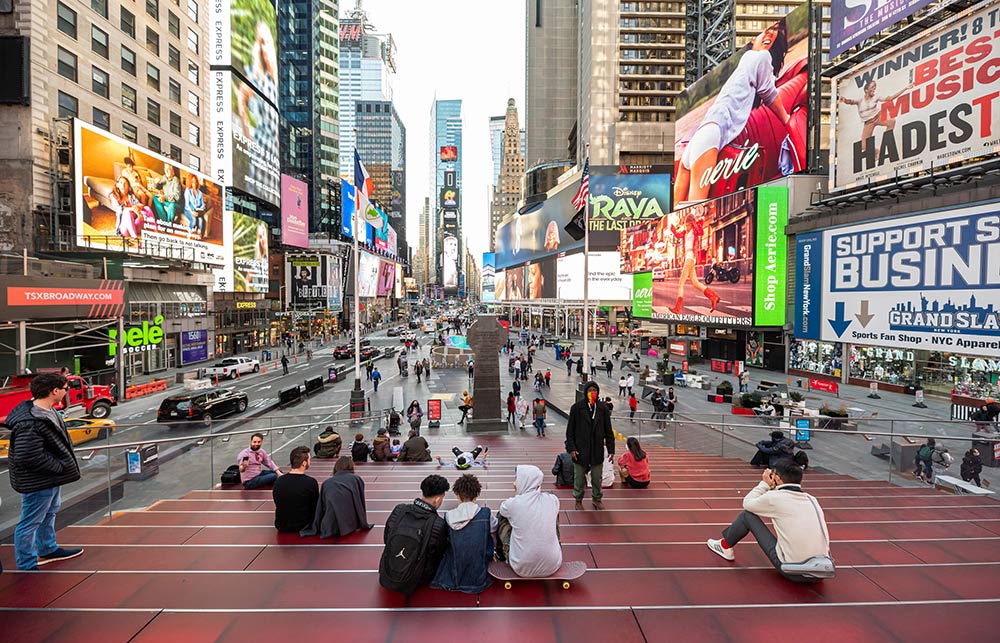
自新冠疫情爆发以来,人们身边充斥着危言耸听的新闻,还有批评现有文明终结的言论。高管和金融专家大胆宣称,一旦疫情得到控制、疫苗普及之后,人们将继续生活在远郊,继续网购、在家做饭、跟朋友和同事在线联系,不会聚集在大城市里。
当然,宣称人类行为将永久性改变很吸引眼球,但它忽略了人类的既往历史。人类曾经从战争、瘟疫、疾病和流行病中幸存,然后一直坚定地向城市化迈进。
我们正在经历的全球健康危机很严重,影响深远,然而真有人会相信此次疫情能够超越以前的所有挑战,从根本上改变人类本性吗?
人类是群居动物,不适合离群索居。与他人保持密切关系对人们的心理健康乃至最终生存都至关重要。疫情期间全世界的抑郁和焦虑情绪都在上升,原因正是我们都很想念彼此,想念互动和自然相处,还有群体提供的能量。虽然Zoom和各种视频会议应用程序很强大,未来肯定也很重要,但无法取代也不能抑制人类对联系的需要。
最近关于旅游业的预测不少,仅在2019年旅游业就为美国经济创造了2.6万亿美元收入,支撑了1580万个岗位。其中最狡猾的说法是,今后多年里人们都不会返回城市,甚至可能永远不返回。简直荒谬。(Expedia集团的主要业务是旅游预订,将因为城市旅游反弹受益。)
我以前住的地方离世贸中心(World Trade Center)大约20个街区。“9·11”事件后,人们普遍担心纽约市无法恢复,旅游业的好日子也一去不返。大规模人口外流的风险会渗透到曼哈顿的每个角落。
显然,我们都知道后来的真实情况。居民和企业都回去了。纽约市的房地产蓬勃发展、经济增长强劲、外来移民增加,是的,旅游业也创下纪录。
人们总有理由回到城市。商业和工作是重要的吸引力,不过人才是核心。即便在最黑暗的时期,人们对大都市文化、社区和智慧头脑的渴望也持续存在。
实际上,自工业革命(Industrial Revolution)以来,尽管出现过破坏性的战争和疫病,人们还是逐渐涌向城市。联合国(UN)的一份报告显示,在1950年至2018年期间,全球的城市人口增长了四倍,2007年,城市人口的数量首次超过了农村人口。
2019年的一项研究显示,70%的美国家庭自称生态家庭。我们知道很多城市都非常重视可持续发展,很适合步行,也注重提高移动便利性和整合交通减少排放。如果认为历史上最关心环保的一代人会突然放弃价值观,在恐慌时刻搬到郊区,那实在是想得太多了。
除此之外,城市将始终是旅游的重要核心,既可以是目的地,也能够当枢纽。
在疫情爆发之前,欧睿国际(Euromonitor International)就发现,最受欢迎的入境目的地不出所料地是曼谷、巴黎和伦敦等城市。Expedia集团(Expedia Group)也发现人们对城市旅游持续抱有兴趣。截至今年3月,从Expedia.com网站的航班预订来看,人们已经计划返回城市,洛杉矶、西雅图,当然还有纽约市,都在2021年6月至8月十大最受欢迎的旅游目的地之列。
多亏全球科学界努力研究,多种有效疫苗都在生产中,还有更多的新疫苗即将问世。生活一定会重启,就像世界各地的人们渴望剧场、博物馆、美食、熙熙攘攘、欣赏城市美丽和规模一样。人们将在全世界穿梭,住酒店。从某种意义上说,旅行者将重新感受生命的活力。全球复兴就在不远处,历史经验表明,首先感受到复苏的正是城市。(财富中文网)
彼得·克恩是Expedia集团副董事长兼首席执行官。
译者:夏林
自新冠疫情爆发以来,人们身边充斥着危言耸听的新闻,还有批评现有文明终结的言论。高管和金融专家大胆宣称,一旦疫情得到控制、疫苗普及之后,人们将继续生活在远郊,继续网购、在家做饭、跟朋友和同事在线联系,不会聚集在大城市里。
当然,宣称人类行为将永久性改变很吸引眼球,但它忽略了人类的既往历史。人类曾经从战争、瘟疫、疾病和流行病中幸存,然后一直坚定地向城市化迈进。
我们正在经历的全球健康危机很严重,影响深远,然而真有人会相信此次疫情能够超越以前的所有挑战,从根本上改变人类本性吗?
人类是群居动物,不适合离群索居。与他人保持密切关系对人们的心理健康乃至最终生存都至关重要。疫情期间全世界的抑郁和焦虑情绪都在上升,原因正是我们都很想念彼此,想念互动和自然相处,还有群体提供的能量。虽然Zoom和各种视频会议应用程序很强大,未来肯定也很重要,但无法取代也不能抑制人类对联系的需要。
最近关于旅游业的预测不少,仅在2019年旅游业就为美国经济创造了2.6万亿美元收入,支撑了1580万个岗位。其中最狡猾的说法是,今后多年里人们都不会返回城市,甚至可能永远不返回。简直荒谬。(Expedia集团的主要业务是旅游预订,将因为城市旅游反弹受益。)
我以前住的地方离世贸中心(World Trade Center)大约20个街区。“9·11”事件后,人们普遍担心纽约市无法恢复,旅游业的好日子也一去不返。大规模人口外流的风险会渗透到曼哈顿的每个角落。
显然,我们都知道后来的真实情况。居民和企业都回去了。纽约市的房地产蓬勃发展、经济增长强劲、外来移民增加,是的,旅游业也创下纪录。
人们总有理由回到城市。商业和工作是重要的吸引力,不过人才是核心。即便在最黑暗的时期,人们对大都市文化、社区和智慧头脑的渴望也持续存在。
实际上,自工业革命(Industrial Revolution)以来,尽管出现过破坏性的战争和疫病,人们还是逐渐涌向城市。联合国(UN)的一份报告显示,在1950年至2018年期间,全球的城市人口增长了四倍,2007年,城市人口的数量首次超过了农村人口。
2019年的一项研究显示,70%的美国家庭自称生态家庭。我们知道很多城市都非常重视可持续发展,很适合步行,也注重提高移动便利性和整合交通减少排放。如果认为历史上最关心环保的一代人会突然放弃价值观,在恐慌时刻搬到郊区,那实在是想得太多了。
除此之外,城市将始终是旅游的重要核心,既可以是目的地,也能够当枢纽。
在疫情爆发之前,欧睿国际(Euromonitor International)就发现,最受欢迎的入境目的地不出所料地是曼谷、巴黎和伦敦等城市。Expedia集团(Expedia Group)也发现人们对城市旅游持续抱有兴趣。截至今年3月,从Expedia.com网站的航班预订来看,人们已经计划返回城市,洛杉矶、西雅图,当然还有纽约市,都在2021年6月至8月十大最受欢迎的旅游目的地之列。
多亏全球科学界努力研究,多种有效疫苗都在生产中,还有更多的新疫苗即将问世。生活一定会重启,就像世界各地的人们渴望剧场、博物馆、美食、熙熙攘攘、欣赏城市美丽和规模一样。人们将在全世界穿梭,住酒店。从某种意义上说,旅行者将重新感受生命的活力。全球复兴就在不远处,历史经验表明,首先感受到复苏的正是城市。(财富中文网)
彼得·克恩是Expedia集团副董事长兼首席执行官。
译者:夏林
Since the outset of the pandemic, we’ve been inundated by alarmist news and talking heads decrying the end of civilization as we know it. Executives and financial experts have boldly claimed that once COVID-19 is under control and a vaccine is available for mass consumption, people will continue with the quarantine lifestyle—living in exurban areas, shopping only online, cooking at home, and connecting virtually with friends and colleagues instead of gathering in-person in the major metropolitan centers of the world.
Sure, declaring human behavior is forever changed makes for a good headline, but it ignores all of human history. Humanity has survived war, pestilence, disease, and pandemic. Yet it has inexorably continued its march toward the citification of the world.
The global health crisis we’re living through is serious, and it will have lasting effects, but does anyone truly believe this event, beyond all those previous challenges, is capable of fundamentally altering human nature?
We are social animals, not designed for isolation. Maintaining close relationships with others is essential to our mental health and, ultimately, our survival. There is a reason depression and anxiety are rising all over the world. It’s because we miss one another—the interaction, the spontaneity, the energy of it all. Zoom and other videoconferencing tools are great and will certainly be important in our future, but they cannot replace, nor suppress, the need for human connection.
We’ve seen many predictions about the travel industry lately—an industry that generated $2.6 trillion for the U.S. economy in 2019 alone, supporting 15.8 million American jobs. Among the most insidious claims is that people won’t return to cities for years, if ever. This is patently absurd. (As a travel booking company, Expedia Group would benefit from travel to cities bouncing back.)
I used to live about 20 blocks from the World Trade Center. Following 9/11, there was widespread concern that New York City could not recover, and tourism would never be the same. The threat of mass exodus pervaded every corner of Manhattan.
Of course, we all know what happened. Residents and businesses returned. New York City witnessed booming real estate values, strong economic growth, inward migration, and, yes, record tourism.
People always find their way back to cities. Businesses and work are an essential part of the appeal, but people are the heart. An insatiable craving for the culture, community, and bright minds that make up metropolitan areas persists, even in the darkest times.
In fact, since the Industrial Revolution, despite devastating wars and pandemics, people have increasingly flocked to cities. Between 1950 and 2018, the world’s urban population grew fourfold, according to a UN report, with the number of people living in cities outnumbering those in rural areas for the first time in 2007.
A 2019 study showed that seven in 10 American homes classify themselves as eco-households. We know many cities are sustainability superheroes; they are walkable and focused on reducing emissions by enhancing mobility and integrating transportation. It’s a far reach to think that the most environmentally conscious generations in history will suddenly abandon their values and move to the suburbs in a moment of panic.
In addition to that, cities will always be the vital core of travel, playing a dynamic role as destinations and hubs.
Before the pandemic hit, Euromonitor International found the most popular destinations by arrivals were, unsurprisingly, cities like Bangkok, Paris, and London. At Expedia Group, we’ve seen firsthand sustained interest in traveling to cities. Flight reservations on Expedia.com as of March indicate people are already planning their return to cities, with Los Angeles, Seattle, and, of course, New York City ranking among the top 10 most popular destinations from June through August of 2021.
With the global scientific community’s incredible work, multiple effective vaccines are now in production, with more coming. There is little doubt that life will be back, just as there is little doubt that people from around the world will crave the theater, museums, food, hustle and bustle, and beauty and scale of our cities. They will fly across the world; they will stay in hotels; they will, in some sense, feel alive again. Renewal is coming for the world, and history shows us that it will be coming for our cities first.
Peter Kern is vice chairman and chief executive officer of Expedia Group.






